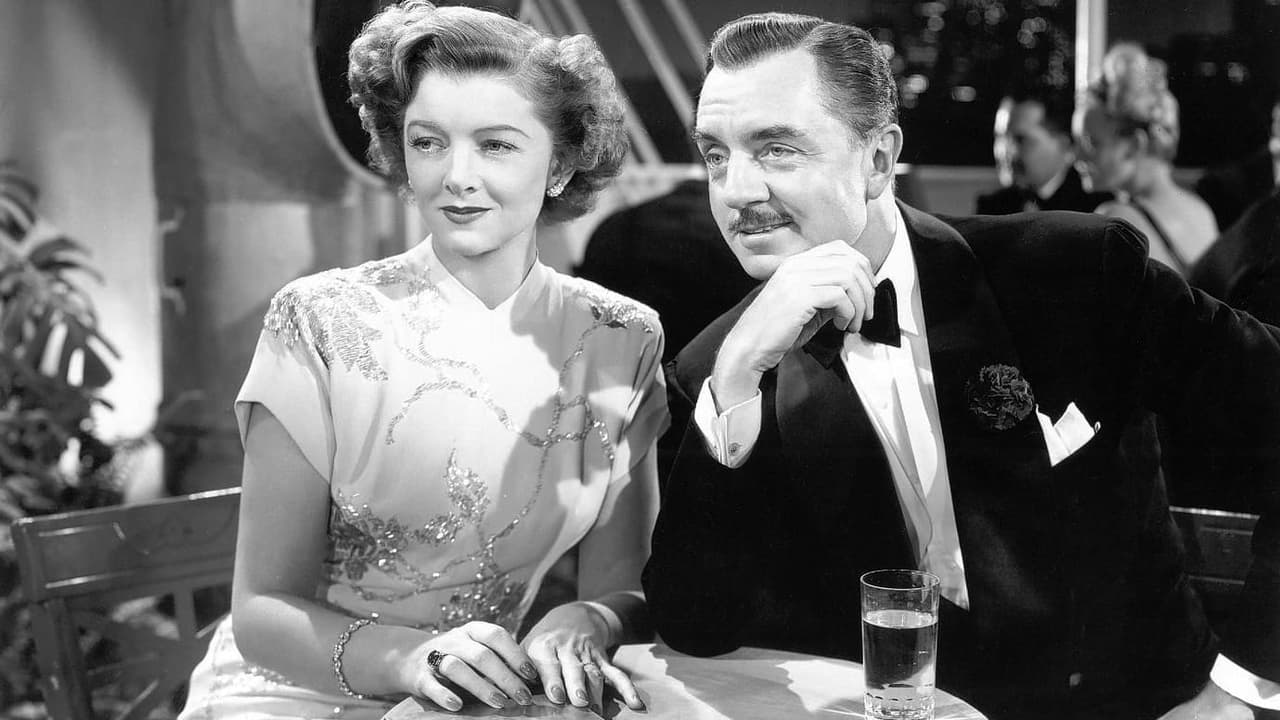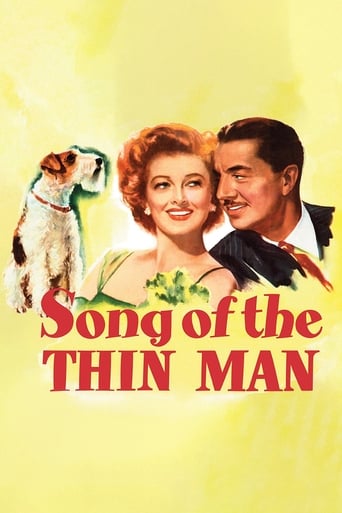

Most of the reviewers here for this film appear to fall right in line with the common perception that this was one of, if not the weakest of the Thin Man films. But you know what? I liked it. I think a lot of it had to do with the hep-cat dialog coming from clarinetist Clinker Krause (Keenan Wynn), and if there was a better supporting cast in the series elsewhere, I think you'd be hard pressed to find it. Besides Wynn, you had Leon Ames, Gloria Grahame and Jayne Meadows, and the kicker would be Dean Stockwell, still a kid as young Nick Charles Jr.As usual, and despite my best efforts to follow the characters and situations, it's virtually impossible to solve the mystery presented, but getting there is much of the fun. I knew that necklace would wind up being instrumental in solving a murder as soon as Nick (William Powell) picked it up the first time, but gee, what's with Mrs. Talbin (Patricia Morrison)? She would have gotten her revenge when her husband confessed to killing Drake (Phillip Reed). I think you'd have to call her shooting of Mitchell Talbin (Ames) an unforced error. Oh well, too bad.So for a swan song, I think Nick and Nora Charles went out respectably. Powell by this time was showing his age a bit but Myrna Loy still looked great, though both conceding that perhaps their party hearty days may have been well behind them. Even Asta still had a few good scenes left in him, working the bedroom gimmick for maximum effect. Spanning a period of slightly over a dozen years, I think the Thin Man series came to a successful conclusion with this entertaining swan song.
... View MoreSONG OF THE THIN MAN (Metro-Goldwyn-Mayer, 1947), directed by Edward Buzzell, reunites the popular team of William Powell and Myrna Loy for the thirteenth time in what proved to become their sixth and final go round as society sleuths Nick and Nora Charles. Though final installments rarely measure up to the initial entries, this one is no exception. Being more mystery than comedy, this edition modernizes Nick and Nora from old-style 1930s formula to the then current trend of 1940s film noir scenario. Seemingly a good idea at the time, the results for the Dashiell Hammett created characters may seem out of place. Nicky Jr. is back, this time played by the precocious eleven-year-old Dean Stockwell, while Asta (no screen credit given) is around to make things familiar to somewhat different proceedings.The 86 minute story gets underway as Nick and Nora Charles (William Powell and Myrna Loy) attend a social function on board a gambling vessel, the S.S. Fortune, as guests of David I. and Jessica Thayer (Ralph Morgan and Bess Flowers). As Nick enjoys a few drinks, situations start to occur. Tommy Drake (Philip Reed), the ship's band-leader, gets into a fight with clarinet player, Buddy Hollis (Don Taylor), the former beau of singer, Fran Ledeu Nash (Gloria Grahame), who left him over for Drake. In desperate need of $12,000 to pay off his gambling debts to mobster, Al Amboy (William Bishop), Drake tries to get a loan from his agent, Mitchell Tablin (Leon Ames - sans mustache), but is refused. Tamblin's attractive wife, Phyllis (Patricia Morison), is secretly attracted to Drake. Janet Thayer (Jayne Meadows) loves Phil Orville Brandt (Bruce Cowling), the ship's manager, and against her father's wishes, elopes with him. Before the night is over, Tommy Drake is murdered and Brandt becomes the prime suspect. Brandt and Janet come to Nick Charles at his luxurious apartment for help, but because of the circumstances, has Brandt arrested. After an unforeseen gunshot occurs, Nick comes out of retirement (again). Rather than joining forces with the police, he has both Nora and the jive talking Clarence "Clinker" Krause (Keenan Wynn) accompany "boss man" in the investigation, which leaves Nicky Jr. (Dean Stockwell), a big fan of murder mysteries, in the care of their housekeeper, Bertha (Connie Gilchrist). In due time, the trio go through all night investigations and questioning (amazing how many suspects are still awake at 4:30 a.m.), with another murder taking place leading the trio on a trip to a private institution of the Valley Rest Home in Poughkeepsie to locate a missing witness. Taking the next train back to New York, situations turn dramatic when Nora gets an intuition that her son might be in great danger.For this installment, some elements work, others do not. Comedy wise, there's Asta's cute reaction as he observes Nick's effort to discipline the junior thin man with a spanking, though Nick's envisioned flashbacks from the seat his son's pants hold him back. There's also a run-on gag with Asta caught sleeping with Nicky on his bed, and returning to his own sleeping corner where he belongs, then returning to Nicky's bed after Nora closes the door. Though such scenes offer some lighter moments, other situations of amusements and one-liners fall short of any originality. What is new are interludes of jazz music and interesting camera tracking on two night club performers (Grahame and Taylor); Nick having Nora joining forces with him and musician (Wynn) rather than a police inspector; and Nora's confrontation and near death experience with a mentally unbalanced patient. A brutal shooting of one of the suspects followed by Nick and Nora getting ready for bed and not being disturbed by what they've witnessed seems a little out of character, yet after all these murder cases, they're probably used to it. One let-down is the traditional climax of Nick's gathering of suspects which isn't as suspenseful as it once was. How times have changed.Reportedly the lesser of "The Thin Man" series mainly due to Powell and Loy not fitting in with this modernized screenplay. No doubt had the same basic premise been used in a non-"Thin Man" mystery in something titled "Gambling Ship" starring, for example, Robert Mitchum and Ava Gardner, and retaining much of the supporting cast, this might turned out to be a successful forties style outing. One would assume that had the writers kept the traditional balance of comedy and murder as before, they might have kept this from becoming SWAN SONG OF THE THIN MAN.And what is the song of the thin man? Well, possibly, "You're Not So Easy to Forget" by Herb Magidson and Ben Oakland, sung by Gloria Grahame. A worthy dedication to Powell's Nick Charles, who's not so easy to forget. Definitely not the finish of Nick and Nora Charles, "The Thin Man" returned on television as a weekly half hour 72-episode series (1957-59) starring Peter Lawford and Phyllis Kirk. As for the theatrical series, this and other "Thin Man" capers, all available on home video and DVD, can be seen occasionally these days on Turner Classic Movies. (**1/2 martinis)
... View MoreFor the past year, I have looked towards each new instalment of the 'Thin Man' adventures with great enthusiasm. The original film, released in 1934, took me completely by surprise, a hard-boiled detective story that turned out of be a remarkably witty mystery/comedy, with William Powell and Myrna Loy as a husband-and-wife detective team who never fail to solve even the most baffling of murders. Though 'The Thin Man (1934),' followed closely by 'After The Thin Man (1936),' are undoubtedly the best of the lot, what struck me most is how incredibly consistent the series has proved to be, never anything less than entertaining despite consisting of an epic six films released over a thirteen-year period. 'Song of the Thin Man (1947)' is the sixth and final film, and, though regrettably the least of the series, the comedy still packs a punch when it is required, and the chemistry between Powell and Loy shows no sign of slowing down, despite the pair noticeably beginning to show their respective ages (Powell was 55 years of age, and Loy was 42).'Song of the Thin Man' sees Nick and Nora Charles semi-retired from detective work, caring for their growing son Nick Charles, Jr. (played by a young Dean Stockwell). There is a clever and amusing scene near the beginning of the scene when Nora orders her husband to spank young Nicky, as punishment for trying to escape piano lessons in favour of baseball. As a reluctant Nick, Sr. tries to assemble his courage, he imagines memories of young Nicky being born and growing up, reinforcing his unwillingness to punish the boy. However, after recollecting the moment when he crashed a bicycle to Nicky's great amusement, Nick unleashes a wallop of beatings that would undoubtedly have left the boy with an aching behind had he not mischievously hidden a baseball glove in his trousers. Asta the dog remains a prominent character in the film, though noticeably played by a different canine actor {the original Asta, a.k.a. Skippy, seemingly retired after 'The Thin Man Goes Home (1944)'}.This time around, Nick and Nora decide to investigate the mysterious murder of Tommy Drake (Phillip Reed), an unpopular jazz band-leader. In order to fully understand the motives and identity of the killer, the pair must descend into the ultra-hip world of jazz musicians, led by an enthusiastic guide in Clarence "Clinker" Krause (Keenan Wynn), who makes a perfect comedic sidekick. Though the ending of the film, particularly the revalation, is disappointingly weak, 'Song of the Thin Man' mostly stays true to the tried-and-tested formula of the previous films, producing a solid and entertaining murder mystery with no great shortage of amusing wise-cracks. Now that I've completed Nick and Nora's adventures, I can now rank the films as such: 1) The Thin Man; 2) After the Thin Man; 3) Shadow of the Thin Man; 4) The Thin Man Goes Home; 5) Another Thin Man; 6) Song of the Thin Man So help yourself to another martini, and then enjoy the entire series again!
... View MoreWhen Nick goes out to the gambling ship to investigate Asta (his dog) finds a single edged razor blade on the floor of the ransacked office/stateroom. Nick searches the cabin for a while before noticing that Asta is excited about the blade.Nick picks it up, ponders it for a minute and says, "No. I don't think it was Somerset Maugham." Apparently the only point of this little scene is to make a reference to the movie and book, "The Razor's Edge" http://www.imdb.com/title/tt0038873/by Somerset Maugham which was written in 1944 and filmed in 1946.
... View More